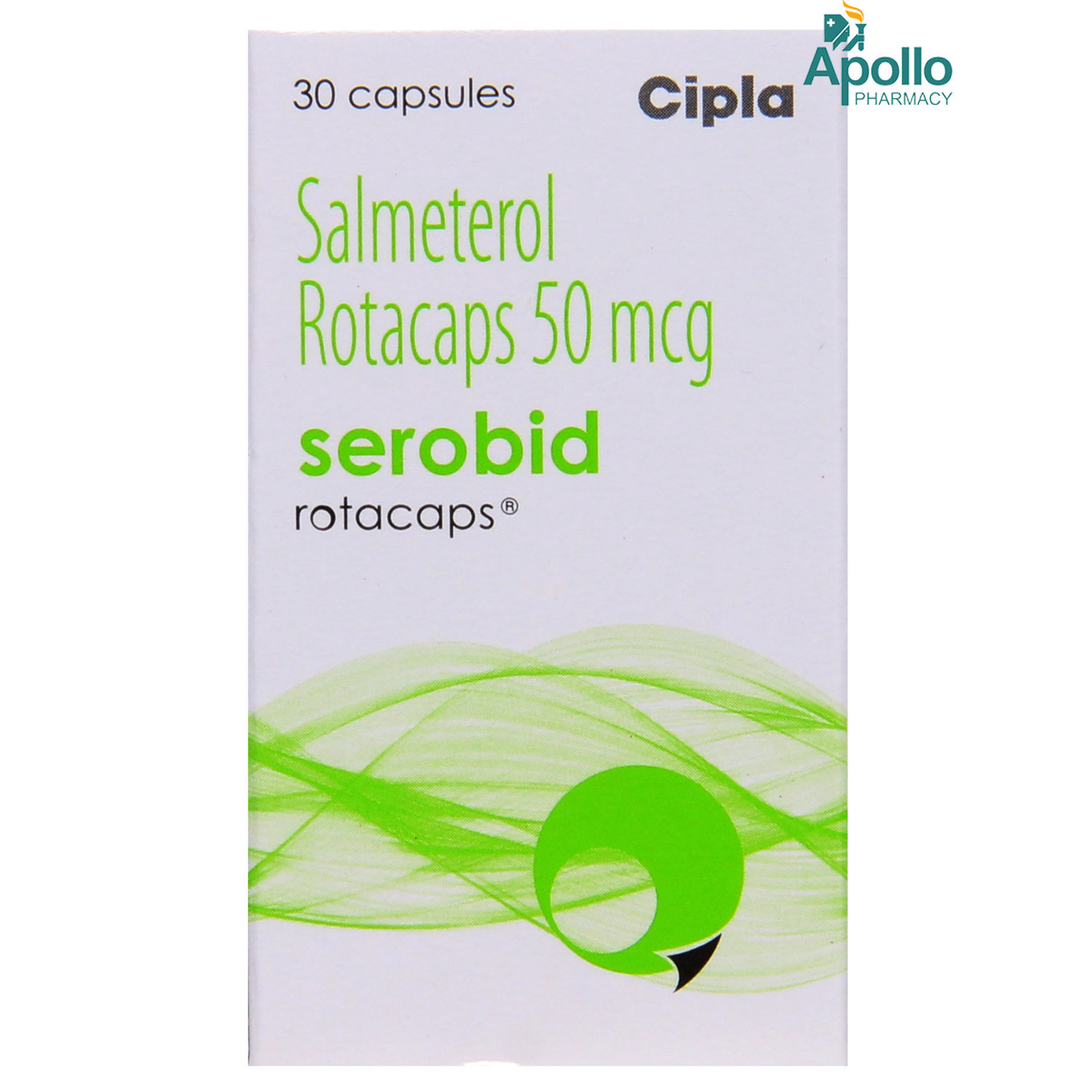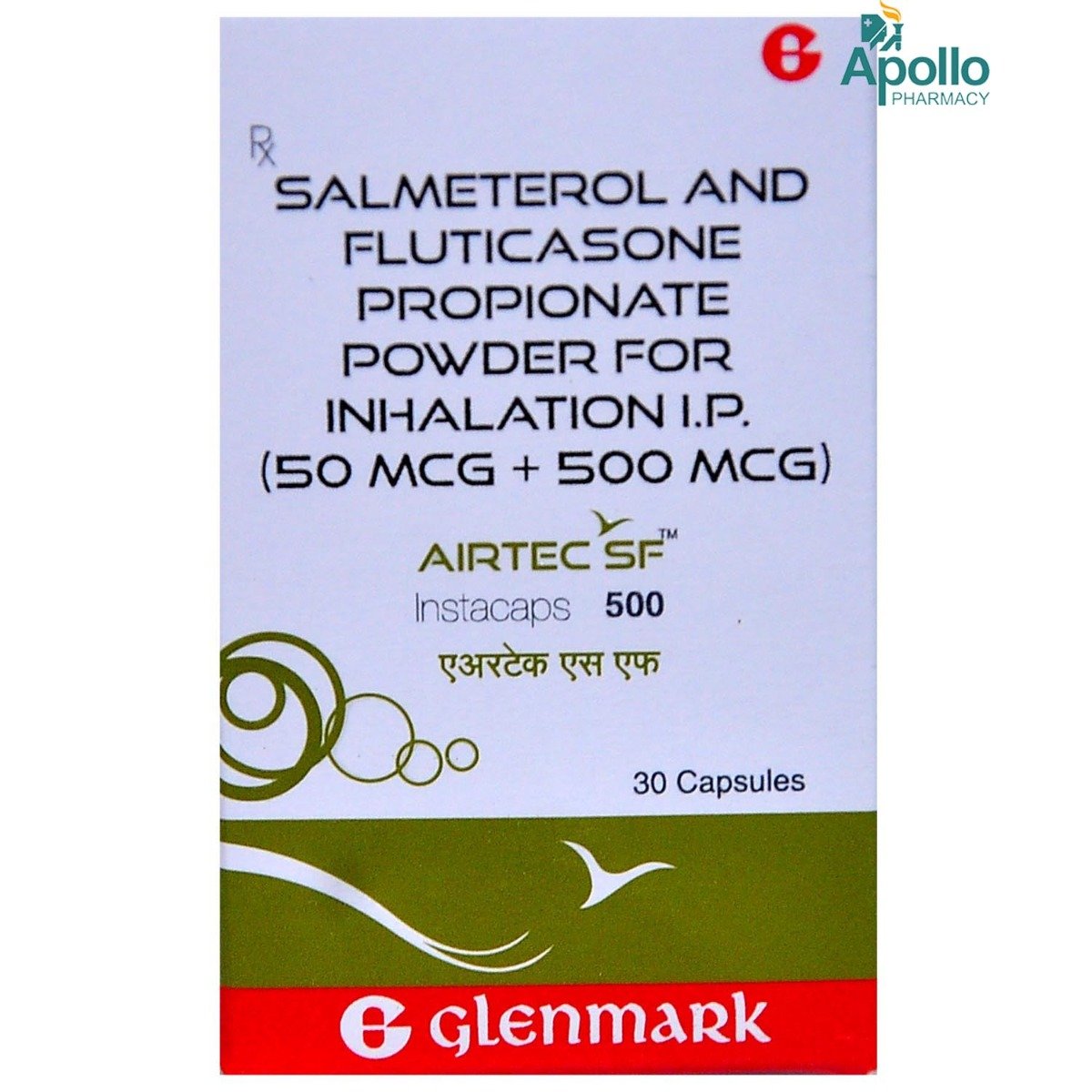Salmeterol
About Salmeterol
Salmeterol is a respiratory medication primarily used to treat and prevent asthma and chronic obstructive pulmonary diseases (COPD) like bronchitis (inflammation of the lining of your bronchial tubes) and emphysema (shortness of breath). Asthma is a chronic (long-term) respiratory condition in which airways narrow, swell and produce extra mucus, leading to difficulty breathing. COPD is a group of lung diseases that causes obstructed airflow from the lungs.
Salmeterol contains ‘Salmeterol’ belongs to the class of bronchodilators. It is a long-acting beta-agonist that relaxes the muscles in the airways and increases airflow to the lungs. Salmeterol makes breathing easier by widening the airways. It helps to prevent asthma attacks in adults and children. If you use Salmeterol for asthma, you must use it together with an inhaled steroid medicine for long-term asthma control.
Salmeterol is for inhalation only. Your doctor will recommend how often you need to take Salmeterol based on your medical condition. Some people may experience headaches, sore throat, sneezing, stuffy nose, restlessness, low fever, palpitations, and muscle cramps. Most of these side effects of Salmeterol do not require medical attention and gradually resolve over time. However, if the side effects persist or worsen, please consult your doctor.
Do not use Salmeterol to treat sudden severe symptoms of asthma or as a rescue inhaler. If you are allergic to Salmeterol or any other ingredients, please tell your doctor. If you are pregnant or breastfeeding, please inform your doctor before using Salmeterol. Salmeterol is not recommended for children below four years of age. Use of Salmeterol may worsen asthma symptoms in some patients. If you experience severe difficulty breathing, please consult a doctor immediately so that alternative medicine may be prescribed. Bronchodilators like Salmeterol can cause hypokalemia. Hence regular monitoring of potassium levels is recommended. Please check with your doctor if you are taking any other prescribed or non-prescribed medicines. Brief your medical history if you have heart, liver, kidney diseases, high blood pressure, hypokalaemia (low potassium levels in the blood), aneurysm (swelling of an artery) and diabetes before taking Salmeterol.
Uses of Salmeterol
Medicinal Benefits
Salmeterol contains ‘Salmeterol’, a bronchodilator used to treat and prevent respiratory disorders like asthma or exercise-induced bronchospasm and chronic obstructive pulmonary diseases (COPD). Besides this, Salmeterol improves pulmonary function and effectively treats and prevents the worsening of emphysema (shortness of breath) and chronic bronchitis (inflammation of the lining of your bronchial tubes). Salmeterol is a long-acting β2 agonist and bronchodilator. It relaxes the muscles in the airways and increases airflow to the lungs. It makes breathing easier by widening the airways. If you use Salmeterol for asthma, you must use it together with an inhaled steroid medicine for long-term asthma control.
Directions for Use
Storage
Side Effects of Salmeterol
- Headache
- Tremor
- Restlessness
- Insomnia (difficulty in sleeping)
- Palpitations
- Muscle cramp
- Throat irritation
- Flu symptoms
- Stuffy or runny nose
Drug Warnings
If you are allergic to Salmeterol or any other ingredients, please tell your doctor. If you are pregnant or breastfeeding, please inform your doctor before using Salmeterol. Do not stop taking Salmeterol of your own unless advised by your doctor. Please do not use Salmeterol to treat sudden severe symptoms of asthma or as a rescue inhaler. Before taking Salmeterol, let your doctor know if have a history of heart, liver, kidney diseases, high blood pressure, hypokalaemia (low potassium levels in the blood), diabetes, seizures (fits) and thyroid disorder. Salmeterol can cause hypokalemia (low potassium levels in the blood), therefore should be used with caution in patients with hypokalaemia to prevent any cardiovascular effects.
Drug Interactions
Drug-Drug Interactions: Salmeterol may interact with bronchodilators (aminophylline, theophylline), drugs used to lower high blood pressure (atenolol, metoprolol, propranolol, carvedilol, labetalol, sotalol, timolol), heart-related medicines (procainamide, quinidine), water pills (furosemide, amiloride, bumetanide), drugs used to treat Hodgkin’s disease (procarbazine), antibiotics (clarithromycin, telithromycin, furazolidone), medicines to induce labor (oxytocin), antidepressants (linezolid, rasagiline, selegiline, tranylcypromine, methylene blue, imipramine, amitriptyline, isocarboxazid, phenelzine), antifungals (itraconazole, ketoconazole), HIV medicines (atazanavir, ritonavir, nelfinavir, indinavir, cobicistat, saquinavir) and antiparkinson drug (levodopa).
Drug-Food Interactions: Avoid consumption of alcohol while taking Salmeterol as it may lead to severe adverse effects.
Drug-Disease Interactions: If you have high blood pressure, diabetes, chest or lungs infection, hyperthyroidism (overactive thyroid), hypokalaemia (low potassium levels in the blood), heart, liver, or kidney problems, inform your doctor before taking Salmeterol.
Drug-Drug Interactions Checker List:
Safety Advice

Alcohol
cautionAvoid drinking alcohol while taking this medicine as it can worsen your side effects.

Pregnancy
cautionSalmeterol is a Category C pregnancy drug and is given to pregnant women only if the doctor thinks benefits outweigh risks. Please consult a doctor if you are pregnant.

Breast Feeding
cautionPlease consult your doctor before using Salmeterol if you are breastfeeding.

Driving
cautionSalmeterol may not affect your ability to drive or use machines. However, if you notice any side effects like dizziness, avoid driving and operating machinery until you feel better.

Liver
cautionSalmeterol should be used with caution in patients with liver diseases. Let your doctor know if you have any history of liver diseases or hepatic impairment. Your doctor will weigh the benefits and potential risks before prescribing Salmeterol.

Kidney
cautionSalmeterol should be used with caution in patients with kidney diseases. Let your doctor know if you have any history of liver diseases or hepatic impairment. Your doctor will weigh the benefits and potential risks before prescribing Salmeterol.

Children
cautionSalmeterol is not recommended for use for children less than 4 years of age. The dose may have to be adjusted by your doctor depending upon the condition of the child's disease and age.
Habit Forming
Diet & Lifestyle Advise
- Take Salmeterol as directed by the doctor and at regular intervals. Do not use other over the counter medications, herbal or vitamin supplements without informing your pharmacist or doctor when you take Salmeterol.
- Know your triggers like allergens, such as pollen, dust and food items that make your asthma severe.
- Quit smoking and avoid passive smoking. Smoking also reduces the effectiveness of the medicine.
- Eat a healthy diet and exercise regularly to strengthen your breathing muscles and boost your immune system.
- Learning breathing exercises will help you move more air in and out of your lungs.
Special Advise
- Regularly monitor your blood sugar levels while using Salmeterol since bronchodilators like Salmeterol can cause low blood glucose levels.
- Consult your diabetologist if you have diabetes before using Salmeterol so that your insulin or other diabetic medication can be adjusted accordingly to maintain your blood sugar levels.
- It is advised to undergo a blood examination to check on your potassium levels since Salmeterol can cause low potassium levels in the blood (hypokalaemia).
Patients Concern
Disease/Condition Glossary
Asthma: It is a chronic (long-term) respiratory condition in which airways narrow, swell and produce extra mucus, leading to difficulty breathing. The asthma symptoms include wheezing (whistling sound while breathing), shortness of breath, chest tightness and cough, especially at night. The symptoms of mild persistent asthma may occur more than two times a week and up to 4 nights in a month, whereas, in the case of severe persistent asthma, the symptoms occur several times every day and most nights.
Chronic obstructive pulmonary disease (COPD): It is a group of lung diseases with emphysema (shortness of breath) and chronic bronchitis (inflammation of the lining of bronchial tubes). The major cause of COPD is smoking tobacco. Also, long-term exposure to fumes and chemicals may lead to COPD. The symptoms include chronic cough, shortness of breath or wheezing (whistle sound while breathing).
Emphysema: It is a lung condition that causes shortness of breath.
Chronic Bronchitis: A lung disease associated with inflammation of the lining of bronchial tubes, which carry air to and from the lungs.
FAQs
Salmeterol is used to treat and prevent respiratory disorders like asthma attacks and chronic obstructive pulmonary diseases (COPD). Salmeterol consists of Salmeterol (bronchodilator) that relaxes the airway's muscles and increases airflow to the lungs. It makes breathing easier by widening the airways.
Salmeterol contains 'Salmeterol', which can cause a rise in blood glucose levels. Hence therapy with Salmeterol is cautiously administered in patients with diabetes. Please monitor your blood glucose levels regularly and inform your doctor so that the dose can be adjusted accordingly.
Salmeterol is not recommended for children below 4 years as the safety and effectiveness were not established. However, please consult a doctor before using Salmeterol in children.
No, you are not recommended to take atenolol with Salmeterol as it may reduce both the medicine's effectiveness. Also, atenolol may trigger asthma attacks or worsen breathing problems by narrowing airways. However, please consult a doctor before using other medicines with Salmeterol.
Salmeterol contains 'Salmeterol' is a Bronchodilator, may decrease the potassium levels in your body, therefore should be used with caution. Please consult your doctor before taking Salmeterol since low potassium levels can lead to other cardiovascular problems in patients with hypokalaemia.
No, Salmeterol does not relieve sudden asthma attacks. Therefore, it is advised to carry a rescue inhaler always to treat sudden asthma symptoms.
Yes, Salmeterol may cause fungal infections in mouth and throat, rinse your mouth wit water after each use to prevent any infections.








